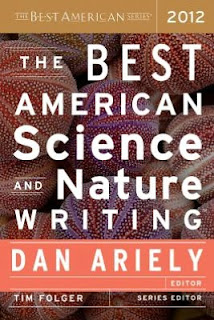Well...this volume hits kind of a weird middle-space for me. Taken individually, the essays in this edition of Best Science and Nature Writing are good pieces of journalism. Six come from The New Yorker, three each from Scientific American, Wired, and National Geographic, two each from Outside, The Atlantic, and Discover, and singles from California Magazine, Popular Science, and Orion. But together...somehow they strike me as lacking in breadth, if that makes sense.
After an introduction focusing in scientific paternalism, Ariely divided the essays into subjects: Bacteria/Microorganisms, Animals, Humans (the Good), Humans (the Bad), Society and Environment, and Technology. However, two of the bacteria/micro essays are about nearly the same thing (normal human microbiota and how that plays into immune response/chronic disease) while the third concerns new food allergy research and treatment. It's hard to determine what's "good" or "bad" about the human sections - I can't tell where the dividing line is ("Sleeping with the Enemy" is in the good section, yet is about how modern humans displaced/bred out the Neanderthal - and extincting species is something we seem to be good at, while "The Feedback Loop" - about how we can modify human behavior to combat speeding and medication non-compliance - is in the bad section). John Seabook's New Yorker article "Crush Point" (which I read in the original publication) is a good piece of human interest/courtroom reporting but doesn't seem to contain a lot of "science" regarding crowd dynamics. It probably would have been better to list the articles alphabetically by author rather than try to group them.
Many of the articles, no matter the scientific ground grown in from paleontology to neurobiology to computer science, apply the information therein to society as a whole. Lab-grown beef, knock-out genes in Mosquitos that could fuel reactions to GMOs, a hazy article about why humans have a connection with an auquarium (the Roberts article about Wallace J. Nichols was an odd one), urban sprawl, molecular gastronomy, an eccentric physicist and the real-world probability of a theoretical quantum computer, if we must defend our humanity from the likelihood a computer could pass the Turing Test/how to be a more "human" human - everything circles back to human or human-like behavior. Given that Ariely is a psychologist that's not surprising but it makes the collection very flat and more like a pet than a presentation of good scientific work across all disciplines.
Current book-in-progress: The Best American Science Writing 2012 (yeah, that other one) - oh, and the Readathon is tomorrow
Current knitted item: Shrug - we are almost to the diamond pattern!
Current movie obsession: Watching The Voice episodes off the DVR
Current iTunes loop: Some free tracks I got from Starbucks - eh, is ok


No comments:
Post a Comment